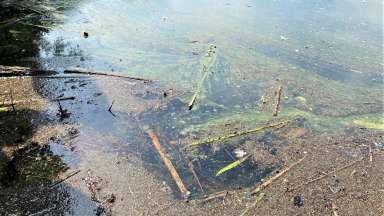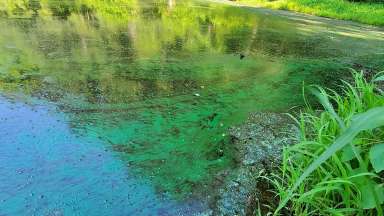Jump To:
Fertilizer contains nutrients that promote plant growth for our lawns and plants when applied properly. If fertilizer is applied too frequently, too heavily, or immediately before too much rain or irrigation, the runoff will carry excess nutrients into local waterways and can cause algae blooms and fish kills.
If you see stormwater pollution, call the Stormwater Helpline at 919-996-3940 or email IllegalDischarge@raleighnc.gov.
Before Applying Fertilizers
Follow these tips before fertilizing to protect our waterways.
1. Read the fertilizer label
- The label will tell you how many square feet can be covered by one bag.
- Look for a “slow-release” or “controlled release” fertilizer if possible.
2. Contain fertilizer spills and grass clippings
- Sweep fertilizer spills from paved surfaces and place back into the container.
- Sweep or blow grass clippings from your walkways or driveways back onto your yard after you cut your lawn.
3. Avoid local waterways
- Don’t fertilize near creeks, streams, or storm drains. A good practice is to keep fertilizer about 10 feet from these waterways.
4. Pay attention to the weather
- Apply fertilizer on dry soil, avoid fertilizing during or before a rainstorm. Instead, use a sprinkler or irrigation system to apply a small amount of water on fertilizer.
5. Use mulch, natural fertilizers, and barriers to reduce your need.
- If you are establishing a new lawn or plantings, consider stormwater practices (straw wattles, silt fences, etc.) on the perimeter of your property that can help contain erosion and stop fertilizers from entering our storm system.

A pond with green algae, grass clippings, and other vegetation floating on top of the water.
Nutrient Sensitive Waters
The City of Raleigh participates in the Neuse Nutrient Strategy, also known as the "Neuse Rules". This effort aims to reduce the amount of nutrient pollution (like fertilizer) that flows into the Neuse River Basin.
All the waters within Raleigh flow into the Neuse River and into the Pamlico Sound, which is the largest lagoon along the East Coast of the United States and has excess concentrations of nutrient pollution from wastewater, stormwater, and agricultural sources.
The North Carolina Department of Environmental Quality manages this initiative and more information can be found on their Neuse River Strategy web page.
